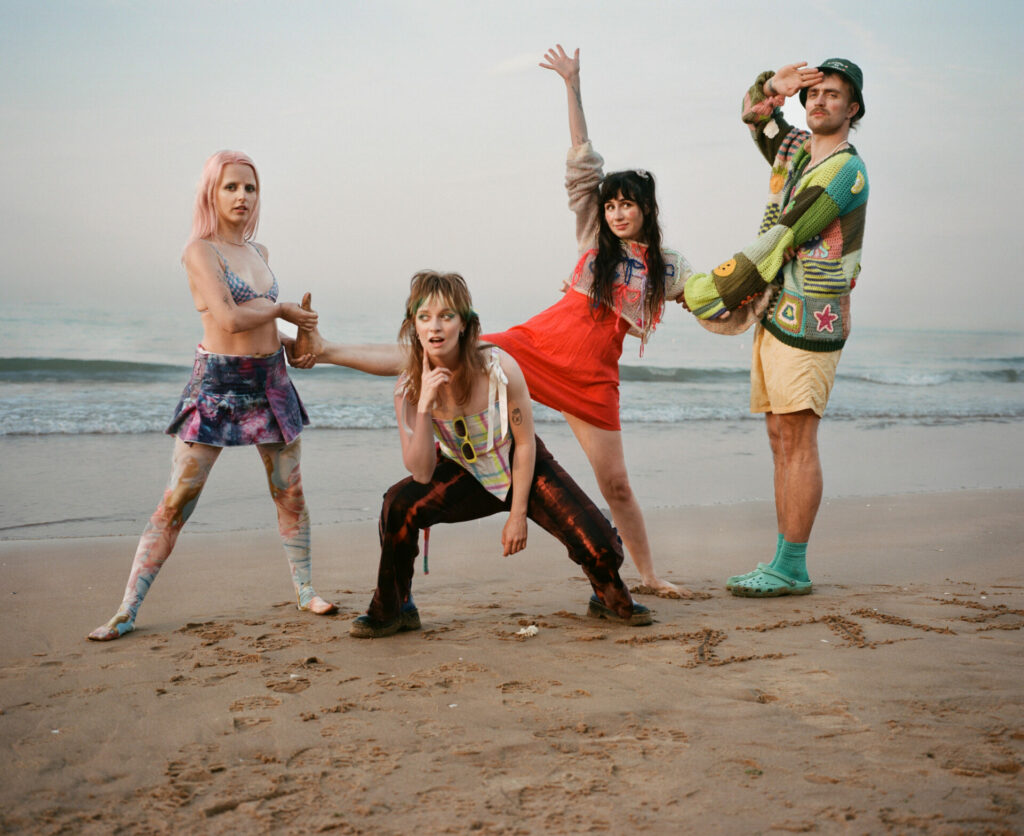Meet FIZZ, the indie pop supergroup discovering life’s secrets
Fun and friendship form the cornerstone of the debut album from Orla Gartland, dodie, Greta Isaac and Martin Luke Brown.
By Joe Goggins

What do you do when you can feel the machinations of the music industry wearing you down? It’s a question that the four members of FIZZ found themselves asking themselves, and each other, as each struggled with the day-to-day grind of keeping their heads above water as solo artists. It wasn’t a feeing born out of a lack of individual success, either, something that each of them have tasted; in 2021, dodie’s debut album went to number three on the UK charts, after a rise to prominence on YouTube that saw her rack up hundreds of millions of views. Orla Gartland’s first album, also released two years ago, made the top ten, too, and met with rave reviews.
Greta Isaac and Martin Luke Brown, meanwhile, have made their own solo waves, the former with a searingly experimental blend of folk and pop and the latter as a singer-songwriter who trades in witty, thoughtful confessionals. Back in June, the four of them revealed themselves to comprise FIZZ, after having initially shrouded their identity in mystery. Their debut album, The Secret to Life, is their answer to the conundrum of how to preserve passion for making art in an unforgiving climate; as they explained to us, the key is to have a laugh with your mates.
Would it have been possible to make a record like this if you weren’t all such good friends to begin with?
Orla Gartland: I think so. We’ve known each other for eight, nine, ten years, and collaborated in different ways; backing vocals on each other’s songs, and I’ve played in dodie’s live band. So, there’s a bedrock there that has helped us fast-track so much of this band. There’s a deep knowing of each other, collectively and individually, and I think the band wouldn’t have come together so quickly without that.
dodie:After lockdown, Greta and Martin moved into this flat with me, and Orla lives just down the road, so we found ourselves hanging out a lot more, and eventually we ended up going out to this studio called Middle Farm in South Devon, where Orla was doing live sessions for her album. It’s run by this production wizard called Pete Miles, who very much encourages people to be themselves musically, and in their lives too. We all worked together there and it felt amazing, like a little taste of escape. It does feel as if the band was destined to be.
Had you all reached a point with your own careers where it felt as if there was something you wanted to escape from?
Martin Luke Brown: 100%, yeah. We made the record over two separate weeks at Middle Farm, the first one being in December of 2021, and I remember saying just before we headed down there the first time, I just wanted a holiday from the reality of what its is to be a musician. It had become very jobbing for me. I love music so, so much, and it’s such a big, expansive thing, but you create your own box to live in and it felt like such a shame that I was stuck in such a narrow little lane. I think we all felt that way a little bit, and there was this unspoken thing of us all wanting to invert how we’d been doing things for the last ten years, and just go back to being 12-year-olds in the garage, hashing it out and having a laugh. And that’s exactly what happened. If anything, it’s gotten a bit out of hand! We weren’t expecting to sign a record deal.
dodie: We’re all very proud of what we’ve done, but I think we wanted to break free from the shackles of what’s expected from us and, also, the pressure we put on ourselves, as well. It was a chance to get away from our own egos and get together as friends, with no expectations.
Greta Isaac: And Middle Farm is a very egoless place; you change your own bedsheets, you cook your own food, you sit around the dinner table every night whether you feel like it or not, and you discuss how you’re feeling. It’s not a results-oriented place at all. Pete is about setting things up as a bit of a playground for you to experiment and then capturing it on tape. That was so refreshing to us coming from London, where it feels like a bit of a treadmill, where you find yourself hunched over a laptop agonising over snare sounds.
Was it important to feel like you could play around with ideas and just follow your noses creatively?
Brown: I know I can be guilty, with my own stuff, of starting out with something amazing and then agonising over it, relentlessly trying to improve on it and perfect it, and all I end up doing is sucking the soul out of it. We were really firm on not allowing that to happen, and letting this be whatever it is.
Isaac: What I found very quickly making this album is that between our friendship and our musical ability, that was enough. It didn’t need to be overthought or analysed; it was a bit like a dream, going in, coming out and only realising what we had once we were finished.
Gartland: It took me until after we’d put twelve songs on a playlist for me to make sense of what we’d made, because it all happened so fast. We didn’t allow ourselves to mess with it after a certain point for the good of the music, which is nice, because now it’s like a time capsule of that moment in our lives.
Brown: I like the idea that it’s going to bring back a load of memories, listening to it when we’re 50 or 60 years old. That’s what we’ll focus on then, not whether the snare sound is exactly right or whether we made a mistake somewhere.
When you were thinking about musical references for the record, was a sense of fun the most important thing?
Isaac: I think the album speaks to what we were craving, not only in our own projects but in music in general. There’s a theatricality to it that goes back tot the seventies and eighties, referencing bands like Queen and Jellyfish, like a high camp to it. That’s something The Last Dinner Party do really well, too, to have this kind of uncompromising grandeur in the way they present music to people. That’s really rare these days.
Brown: It doesn’t feel very Brit, does it? It feels like in this country you have to be very self-effacing, and take up as little room as possible, and be humble and say, “here’s my silly little songs”. Whereas there’s tracks on this album with five key changes!
Gartland: It’s not an album that apologises for itself in any way. That comes from the group mentality where, in our own projects, we might be a little bit more timid but, when there’s safety in number, why not make the songs the loudest, most arrogant versions of themselves?
dodie: And that’s being reflected in the way that we’re presenting it now, visually, which is just uncompromisingly loud. I love when people are proud of the work that they make and don’t apologise for it.

There’s a real mix of songs that are lyrically playful on the record – like ‘Rocket League’ – and tracks that are more thoughtful and vulnerable. How do you go about balancing that?
Brown: Me and Gret have got probably fifty voice notes of songs like ‘Rocket League’. We could have a whole album full of one-minute songs about everyday nonsense. That one started out as the others just having a laugh about me playing Rocket League all the time, and it’s not something I would ever have made into a song myself, but it’s so ridiculous and silly and it encapsulates what we’re about quite nicely.
dodie: The beauty of it being an escape for us is that we didn’t want the album to be too careful or considered; it was just supposed to be about exploring our friendship. And ironically, that’s what’s ended up being the overarching theme, which is that the secret to life is experiencing all that life has to offer with your friends by your side.
Isaac: I feel like only ten years’ worth of friendship can allow for that spectrum of pure, unadulterated silliness, from being goofy to transitioning to more sincere songs like ‘Close One’, ‘As Good As It Gets’ and ‘You, Me, Lonely’, that comes from feeling safe enough to be vulnerable, among people who feel like your family. That was really true at Middle Farm. We’d be crying one minute and cackling with laughter the next.
How does it feel to be finally playing these songs live after sitting on them for a while?
Isaac: We’re all huge fans of each other, but I think when you get to know people so intimately, when you’re having breakfast together every day, or going out for a walk and getting coffee, or having an argument about something – all these everyday things – it’s really easy to forget how talented everybody is. I look over at Orla fucking shredding on the guitar and think, “oh my god! I forgot you play guitar. You were in my flat three hours ago.”
Gartland: There’s something really special about that; just looking around you and being proud of your mates.
Secret to Life is available on September 15 via Decca. FIZZ play eight UK dates from September 29
